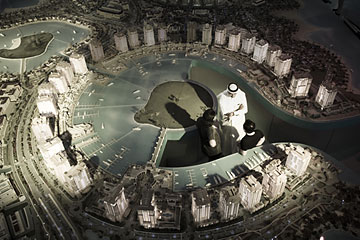
Arealestate sales office for Pearl-Qatar, a man-made-island project
(4 of 5)
Those criticisms have died down, largely because of a growing perception in the region that Qatar's foreign policy is following al-Jazeera's reporting rather than the other way around. To back up the Emir's populist trip to Gaza, Prime Minister Jassim al-Thani took a strong stand at a recent conference in Cairo, pushing for Arab nations to work together to make progress in the Israeli-Palestinian peace process. A cache of U.S. diplomatic cables released on the WikiLeaks website shows that the Prime Minister has long worked behind the scenes on an Israeli-Palestinian accord. Though Qatar's leadership denies taking sides, the Emir's visit to Gaza, controlled by Hamas, was widely interpreted as a snub of its political rival, Fatah, further marking Fatah's irrelevance within the Arab world.
A Subtle Strategy
Gerges of the middle east centre suggests that Qatar, in rewarding Hamas, has been playing a much subtler strategy, one that could paradoxically help Western interests. Hamas, he notes, had long been supported financially and militarily by Iran and Syria, and Syria hosted Hamas' exiled chief Khaled Mashaal. But Hamas was sympathetic to the uprising in Syria, straining that alliance. Qatar invited Mashaal to move to Doha, neatly severing those vexing links to Syria. Hamas needs hundreds of millions of dollars a year to run Gaza. By stepping in with funding, Qatar not only rewarded Hamas for relocating Mashaal but may also have helped reduce the militant group's economic reliance on Iran. "Qatar has managed to wean Hamas from Iran's orbit, steering it to a pro-West axis," says Gerges. "This is a major development, one that could even weaken Iran."
Despite these maneuvers, Qatar has not managed to change the U.S. position on Hamas, which the U.S. has designated a terrorist organization. Asked whether Qatar's influence has successfully weaned Hamas from Iran, a State Department official said, "No, Iran continues to back Hamas as well as to attempt to destabilize the region." Still, the U.S. and Qatar maintain a close alliance. Qatar is home to the largest U.S. military air base in the region, and the Emir visited the White House with the Sheika in April 2011 in part to discuss the Arab Spring.
Buying Influence?
Qatar's interventions have not always been well received or well understood within the region it hopes to lead. Both Bahrain's King Hamad bin Isa al-Khalifa and Yemen's then President Ali Abdullah Saleh complained to U.S. officials about Qatari meddling in 2008 and 2009, according to leaked diplomatic cables from their countries' embassies. Al-Jazeera's populist celebration of the anti-authoritarian uprisings in the region has infuriated Qatar's neighbors, particularly Saudi Arabia. Even Libyans, who benefited most from Qatar's assistance, are now suspicious of its intentions.
